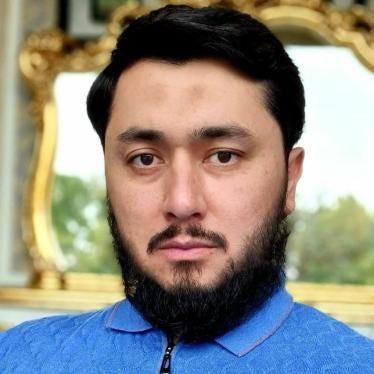In many countries social media has become the infrastructure of discussion in the public sphere. But in Uzbekistan, social media posts are often used as evidence in court against bloggers critical of the authorities.
Uzbek President Shavkat Mirziyoyev has repeatedly claimed he values free expression and the role of bloggers in society. In practice however, numerous bloggers have been prosecuted in recent months, raising renewed concerns about freedom of expression in Uzbekistan.
In two recent cases, Sergey Mayorov, a lawyer, has lodged appeals against sentences imposed on his clients for criticizing the government. Fazilhoja Arifhojaev was sentenced to seven and a half years in prison, and Miraziz Bazarov to three years of house arrest. Mayorov told Human Rights Watch that he was pessimistic about whether the courts would consider the appeals from a human rights perspective.
On January 26, the criminal court in Tashkent’s Almazar district found Arifhojaev guilty under article 244-1 of the criminal code for allegedly threatening public security by reposting and commenting on a Facebook post that had questioned whether it was appropriate for a Muslim to congratulate non-Muslims on their religious holidays. Human Rights Watch has repeatedly urged the authorities to amend article 244-1, which has been used to criminalize peaceful dissent and freedom of religion and belief.
On January 21, the criminal court in Tashkent’s Mirobod district sentenced Bazarov on two counts of slander under article 139-3 of the criminal code for making videos on TikTok and YouTube, allegedly with insulting comments about teachers and pro-government bloggers. Bazarov had been attacked in Tashkent last March and was hospitalized with a broken leg, a severe concussion, and multiple internal and external injuries. Instead of investigating the attack and working to identify his attackers, the authorities opened a criminal case against him as soon as he was discharged from the hospital.
On February 3, the Hazarasp District Criminal Court in Khorezm region sentenced Sobirjon Babaniyazov to three years in prison under article 158 of the criminal code for videos and audio messages on the social media platform Telegram that allegedly insulted the president. Babaniyazov apologized in court and claimed he was drunk when he made the videos. He said he was in despair over the lack of heating gas in his village and unemployment. Babaniyazov had been in pre-trial detention since April 18, 2021.
Insulting the president online was explicitly criminalized last March. The amendment to the criminal code was widely criticized by international and local human rights defenders, who feared it would be used to silence criticism online. Babaniyazov’s case seems to justify those concerns.
House arrest and imprisonment are not the only tools being used to silence critics and discredit bloggers and civil activists. Valijon Kalonov, a 52-year-old blogger and government critic from Jizzakh city, is being held in a psychiatric hospital in the Samarkand region.
Kalonov was arrested last August on charges of insulting the president through mass media and distributing and displaying materials that threaten public safety and public order using social media after he criticized the president and called on YouTube for a boycott of the October election.
In a December 23 verdict, which Human Rights Watch has seen, a criminal court in Jizzakh referred to a psychiatric examination which concluded that Kalonov did not understand and was not fully aware of his actions due to a psychosocial disability and that he required hospitalization. Those who know him are not aware that he has any mental health disability. The court ruled that Kalonov could not be held criminally liable and sent him for compulsory psychiatric treatment.
Notwithstanding the lack of any credible evidence that Kalonov has a psychosocial disability, the forced medical treatment of anyone for that reason is discriminatory and violates the prohibition on ill-treatment. It is not the first time the Uzbek authorities have used forced psychiatric treatment to silence and discredit critics.
On February 22, Ruslan Khairnurov was released from house arrest that he had been under since December 31 for reposting an unverified Facebook message about a regional health employee accepting a bribe. A criminal case against him for slander under Article 139-3 of the criminal code is still pending even though Khairnurov said he deleted the post when he found the information to be untrue.
Arifhojaev, Babaniyazov, Kalonov, Bazarov, and Khairnurov come from different walks of life and have different backgrounds and beliefs, but they have been deprived of their liberty because they used social media platforms to criticize life in Uzbekistan. The authorities should dismiss or vacate these cases.







